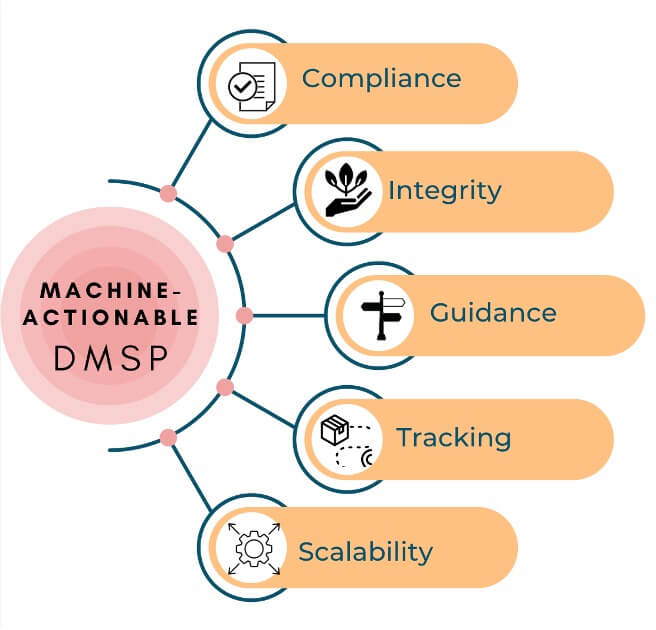This content was originally published by the Association of Research Libraries by Shawna Taylor on October 18, 2024, at ARL and California Digital Library Kick Off Machine Actionable Plans (MAP) Pilot Site Visits at Northwestern University. Reposted with Permission.
In September, the Association of Research Libraries (ARL) and the California Digital Library (CDL) conducted a site visit to the Northwestern University Feinberg School of Medicine’s Galter Health Sciences Library. This visit was part of the Machine Actionable Plans (MAP) Pilot project, funded by the US Institute of Museum and Library Services (grant LG-254861-OLS-23). The pilot explores how scalable infrastructure for data management and sharing, specifically machine-actionable data management and sharing plans, can be implemented across research institutions, integrating new standards and networked functionalities.
 The MAP Pilot is advancing the development of machine-actionable data management and sharing plans (maDMSPs), which are structured, dynamic versions of data management plans. Machine-actionable plans offer significant organizational potential: they can integrate with research workflows and administrative systems across an institution (for example, research information management systems, grant management systems, IRB notifications), enabling automation and streamlining communication. This, in turn, can reduce the workload on researchers and administrators, while improving data discoverability and sharing. With the 2022 CHIPS and Science Act requiring machine-readable data management plans in research proposals (Section 10344b), the MAP Pilot is taking this requirement further by ensuring plans are machine-actionable. CDL is enhancing the DMP Tool by building out its technical functionality to fully support these capabilities.
The MAP Pilot is advancing the development of machine-actionable data management and sharing plans (maDMSPs), which are structured, dynamic versions of data management plans. Machine-actionable plans offer significant organizational potential: they can integrate with research workflows and administrative systems across an institution (for example, research information management systems, grant management systems, IRB notifications), enabling automation and streamlining communication. This, in turn, can reduce the workload on researchers and administrators, while improving data discoverability and sharing. With the 2022 CHIPS and Science Act requiring machine-readable data management plans in research proposals (Section 10344b), the MAP Pilot is taking this requirement further by ensuring plans are machine-actionable. CDL is enhancing the DMP Tool by building out its technical functionality to fully support these capabilities.
Each MAP Pilot institution is exploring unique approaches to implementing maDMSPs locally. The goal of the site visits is twofold: to understand how each institution is planning to integrate maDMSPs into their research workflows, and second, to provide feedback to CDL on new strategies for automating and connecting research data management. This feedback will help shape the development of new features in the DMP Tool.
At Northwestern University Feinberg School of Medicine, the site host team—comprised of Maria Praetzellis (associate director of UC3, CDL), Becky Grady (senior product manager for data management planning, CDL), Shawna Taylor (project manager for open science, ARL), Matthew Carson (head of digital systems, Galter Health Sciences Library), and Sara Gonzales (senior data librarian, Galter Health Sciences Library)—conducted interviews with IT and library administrators, operational staff including library developers and IT research computing specialists, and researchers from both Feinberg and Northwestern University. Alongside the interviews, the team also conducted wireframe testing to gather feedback on how maDMSPs could integrate into existing workflows. Key questions from these discussions included:
- How do machine-actionable Data Management and Sharing Plans (maDMSPs) align with your institution’s broader goals for research data stewardship and open science?
- How might maDMSP integrations improve both research and research administration at your institution?
- What are the biggest challenges and opportunities for implementing maDMSPs?
- What types of resources (human, financial, technical) are necessary to implement and sustain maDMSPs?
- Which university policies, if any, guide how your unit provides research data management support to researchers?
Matt Carson and Sara Gonzales also presented to interviewees and stakeholders on Feinberg’s approach to scalable research data infrastructure as part of the MAP Pilot. A key part of their work is a landscape analysis to assess the current research data services at Feinberg and Northwestern University and to identify opportunities for maDMSP implementation. They are focused on gathering requirements to integrate maDMSPs into existing systems, such as research information management systems, while streamlining workflows to reduce administrative burden. The ultimate goal is to align maDMSPs with institutional policies and improve research data management support.
Matt Carson noted, “The interviewees provided the project team with a variety of unique perspectives on research data services at Northwestern. This experience has not only led us to a better understanding of how maDMSPs could benefit our stakeholders, but also helped to identify key areas where we could improve our RDM support workflows by collaborating with our research services partners on campus.”
As Kristi Holmes, director of Galter Health Sciences Library and associate dean for knowledge management and strategy at Feinberg School of Medicine, added, “Modern research is highly collaborative, requiring a range of roles, expertise, and perspectives. We’re thrilled to participate in the Pilot to investigate the requirements of successful maDMP implementation, adoption, and success.”
This site visit was the first of five scheduled for the pilot this fall. The project team will visit Penn State University Libraries, followed by the University of Colorado, Boulder, the University of California, Riverside, and Arizona State University later this year.
Updated: October 21, 2024